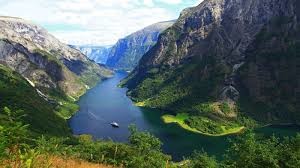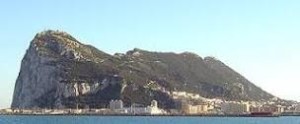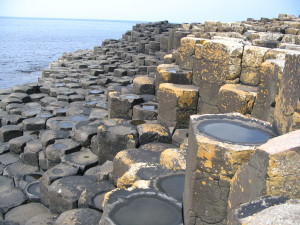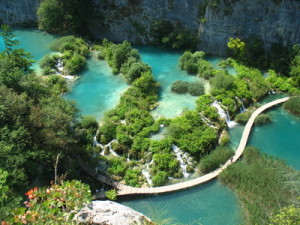Europe is rich with natural wonders – from lakes and mountains to islands, river valleys and seaside vistas. You can even find them in the skies above.
Since any Top Ten list would be totally arbitrary, we’ll stick to a “Ten Top” list, with the understanding that more such lists could – and no doubt will – be on their way in the future.
Several of these natural wonders are familiar names; others may be new to you. But they’re all fully deserving of the title – and a visit.
Here are the first five of the ten; the remaining five will appear in my next post.
The Fjords of Norway
They go by differing names like the Sognefjord, Aurlandsfjord, Trollfjord, and the Hardangerfjord, but they all have one feature in common: these slivers of deep-blue water are among the most beautiful natural wonders in all of Europe.
Norway’s fjords — carved by ancient glaciers — jut into the country like sleek daggers framed by walls of sheer granite. Ranging in length from a few miles to well over 100 and piercing the coastline from southern to northern Norway, the fjords are best viewed by ship or train, including the famously steep Flåm Railway, which travels from Myrdal to Flåm between Oslo and Bergen.
And there are few experiences more scenic and serene than a boat trip on a far northern fjord on a crisp, clear moonlit night, with snow-capped mountains towering over tiny shoreline villages that seem secreted far away from the rest of the world.
The Rock of Gibraltar
Standing guard like a monolithic sentinel at the mouth of the Mediterranean Sea, the Rock of Gibraltar is virtually synonymous with stability and strength. Lying just off the coast of southern Spain, strategically placed Gibraltar was one of the ancient Pillars of Hercules and is currently a British territory (a source of contention with the Spanish).
Escape the politics, crowds, and duty-free liquor stores of the city lying at its base by riding the funicular to the 1,400-foot-high summit and then following pathways for commanding views of the Straits of Gibraltar separating southern Europe from North Africa. (Don’t carry any visible plastic bags, though, or risk losing then to the lightning-quick grasp of the local Barbary macaques – monkeys who identify any such bags as sources of potential food inside.) You’ll feel like you’re standing on top of the world.
Northern Ireland’s Giant’s Causeway
In Irish lore, a legendary giant named Finn MacCool is credited with building the Giant’s Causeway along the winding coast of County Antrim in Northern Ireland (the setting for some of the most spectacular scenery in HBO’s “Game of Thrones.”)
The Causeway is a remarkable formation of basalt columns that stretches into the North Channel for 11 miles, resembling stepping stones leading to Scotland. Its 38,000 multi-sided symmetrical pillars, some as tall as 36 feet, form intricate patterns dubbed the Giant’s Organ, the Giant’s Coffin, the Wishing Chair, and the Ladies Fan, among other fanciful names.
According to modern science, however, the columns were formed by the slow, irregular cooling of lava spilled from an ancient volcano some 670 million years ago. You can judge the origins for yourself during a visit to this UNESCO World Heritage Site.
Croatia’s Plitvice Lakes
The name may be hard to pronounce, but one look at Croatia’s Plitvice Lakes National Park – another UNESCO World Heritage Site – may leave you speechless anyway.
Picture 16 mountain lakes of varying hues and shades of sparkling color – emerald greens, deep blues, turquoises, and teals, which vary with the seasons and the makeup of minerals in the water – all set in a forested landscape and joined together by a series of plunging waterfalls.
Over the course of several miles, you’ll descend about 450 feet via wooden walkways that wind past each lake and waterfall, some skirting the falls so closely that you can inhale their spray. A variety of trails of differing lengths wander through the park, and boat trips are available on the lakes.
Italy’s Amalfi Coast
Europe has many stunning coastlines, but Italy’s Amalfi Coast ranks justifiably at or near the top of the list. A UNESCO World Heritage Site renowned for its quintessential Mediterranean landscape, the Amalfi Coast is located in the region of Campania between the Gulf of Naples and Gulf of Salerno in southwestern Italy.
Dotted by villages clinging to the cliffsides, the coast can be viewed via a 30-mile-long road that weaves up and down over rocky hills that plunge to the Tyrhennian Sea below. Pastel-shaded houses and villas, citrus and olive groves, vineyards, beach-lined coves and rugged promontories add color to the scene.
Several of the towns — some having served as resorts since Roman times — lie along the seaside and can be reached by ferry boat. Others are perched high in the hills. Every town has its cultural landmarks as well – churches and monuments that blend in seamlessly with the unforgettable natural surroundings.
Note: An earlier version of this piece appeared in StrideTravel.com, the website to consult when you’re looking for guided tours, unguided tours, and small-ship and river cruises worldwide.
Next Up: Five more of Europe’s Ten Top Natural Wonders.

















Leave a Reply